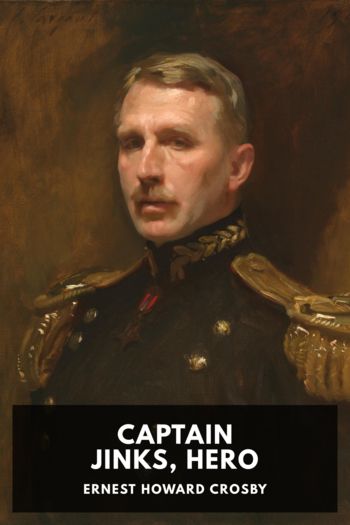Captain Jinks, Hero by Ernest Howard Crosby (story read aloud txt) 📕

- Author: Ernest Howard Crosby
Book online «Captain Jinks, Hero by Ernest Howard Crosby (story read aloud txt) 📕». Author Ernest Howard Crosby
“What funny pillboxes those are that those Anglian soldiers have stuck to the side of their heads,” he said, pointing to two men at Gin-Sin before they set sail.
“Yes,” answered Cleary. “They’ll put on their helmets when the sun gets higher. They do look queer, though. Perhaps they think our fellows look queer too.”
“I never thought of that,” said Sam. “Perhaps they do,” and he looked at his fellow-countrymen who were preparing to embark, endeavoring to judge of their appearance as if he had never seen them before. He scrutinized carefully their slouch hats creased in four quarters, their loose, dark-blue jackets, generally unbuttoned, and their easygoing movements.
“Perhaps they do look queer,” he said at last. “I never thought of that.”
The river was more full of corpses than ever, and there were many to be seen on the shore, all of them of natives. Children were playing and bathing in the shallows, oblivious of the dead around them. Dogs prowled about, sleek and contented, and usually sniffing only at the cadavers, for their appetites were already sated. At one place they saw a father and son lying hand in hand where they had been shot while imploring mercy. A dog was quietly eating the leg of the boy. The natives who pulled the boat along with great difficulty under the hot sun were drawn from all classes, some of them coolies accustomed to hard work, others evidently of the leisure classes who could hardly keep up with the rest. Soldiers were acting as taskmasters, and they whipped the men who did not pull with sufficient strength. Now and then a man would try to escape by running, but such deserters were invariably brought down by a bullet in the back. More than once one of the men would fall as they waded along, and be swept off by the current. None of them seemed to know how to swim, but no one paid any attention to their fate. Parties were sent out to bring in other natives to take the place of those who gave out. One of the men thus brought in was paralyzed on one side and carried a crutch. The soldiers made sport of him, snatched the crutch from him, and made him pull as best he could with the rest. Sam, Cleary, and an Anglian officer who had served through the whole war took a long walk together back from the river during the halt at noon. They entered a deserted house, with gables and a tiled roof, which by chance had not been burned. The house had been looted, and such of its contents as were too large to carry away were lying broken to bits about the floor. A nasty smell came from an inner room, and they looked in and saw the whole family—father, mother, and three daughters—lying dead in a row on the floor. A bloody knife was in the hand of the man.
“They probably committed suicide when they saw the soldiers coming,” said the Anglian, whose name was Major Brown. “They often do that, and they do quite right. When they don’t, the soldiers, and even the officers sometimes, do what they will with the women and then bayonet them afterward. Our people draw the line at that, and so do yours.”
“We certainly conduct war most humanely,” said Sam.
They heard a groan from another room, and opening the door saw an old woman lying in a pool of blood, quite unconscious.
“I’ll put her out of her misery,” said the major, and he drew his revolver and shot her through the head.
The journey was a very slow one and occupied three days, although the natives were kept at work as long as they could stand it, on one day actually tugging at the ropes for twenty-one hours. At last, however, the Imperial City was reached, and our two travelers disembarked and, taking a donkey-cart, gave directions to carry them to the quarter assigned to their own army. Here as everywhere desolation reigned. A string of laden camels showed, however, that trade was beginning to reassert itself. They drove past miles of burned houses, through the massive city walls and beyond, until they saw the welcome signs of a camp over which Old Gory waved supreme. Sam was received with much cordiality by the commandant, General Taffy, and assigned to the command of the 27th Volunteer Infantry. The general was a man well known throughout the army for his courage and ability, but notwithstanding this Sam took a strong prejudice against him, for he seemed to be halfhearted in his work and to disapprove of the prevailing policy of pacification by fire and sword. Sam ascribed this feebleness to the fact that he had been originally appointed to the army from civil life, and that he had not enjoyed the benefits of an East Point education.
As soon as Sam was installed in his new quarters, in the colonel’s tent of his regiment, he started out with Cleary to see the great city and examine the scene of the late siege. They found the Jap quarter the most populous. The inhabitants who had fled had returned, and the streets were taking on their normal aspect. Near the boundary of this district they saw a house with a placard in the Jap language, and asked an Anglian soldier who was passing what it meant.
“That’s one of the Jap placards to show that the natives





Comments (0)